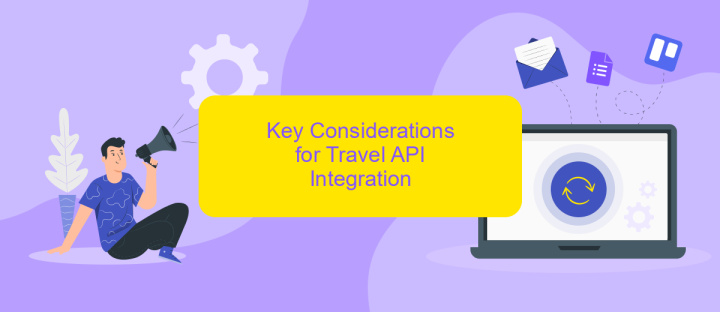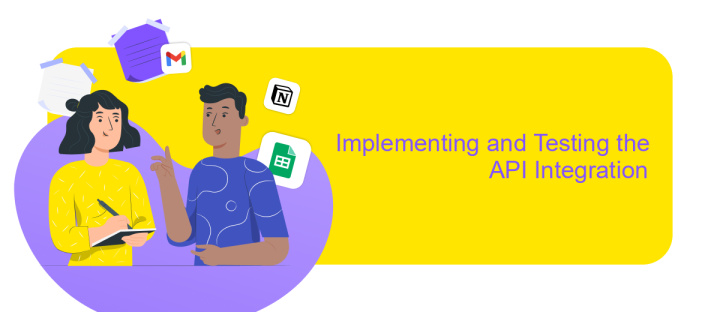Travel API Integration
In today's fast-paced digital world, seamless travel experiences are more important than ever. Travel API integration plays a crucial role in connecting various service providers, enabling businesses to offer comprehensive travel solutions. By integrating APIs, travel companies can access real-time data, streamline operations, and enhance customer satisfaction, ultimately transforming the way travelers plan and book their journeys. Discover how this technology is revolutionizing the travel industry.
Introduction to Travel APIs and Their Benefits
In the ever-evolving travel industry, technology plays a pivotal role in enhancing user experiences and streamlining operations. Travel APIs (Application Programming Interfaces) are essential tools that facilitate seamless integration between different travel services, allowing businesses to offer comprehensive solutions to their customers. These APIs enable the exchange of data between various systems, such as airlines, hotels, and car rental services, making it easier for travel agencies to provide up-to-date information and personalized offerings.
- Real-time access to a wide range of travel data, including flight schedules, hotel availability, and pricing.
- Enhanced user experiences through personalized travel recommendations and dynamic packaging.
- Streamlined booking processes, reducing manual input and minimizing errors.
- Increased operational efficiency by automating routine tasks and data management.
- Opportunities for innovation and differentiation in a competitive market.
By leveraging travel APIs, businesses can not only improve their service offerings but also enhance customer satisfaction and loyalty. These integrations empower companies to stay competitive by providing innovative solutions that meet the evolving demands of modern travelers. As the travel industry continues to grow, the adoption of APIs will be crucial in driving digital transformation and ensuring sustainable success.
Choosing the Right Travel API for Your Needs

When selecting a travel API, it's crucial to assess your specific needs and objectives. Consider the types of services you require, such as flight bookings, hotel reservations, or car rentals. Evaluate the API's coverage to ensure it includes the destinations and services relevant to your business. Additionally, review the API's documentation and support resources to confirm they are comprehensive and user-friendly, facilitating a smoother integration process. Cost is another critical factor; compare pricing models to find an API that fits within your budget without compromising on essential features.
For those looking to streamline the integration process, services like ApiX-Drive can be invaluable. ApiX-Drive offers a user-friendly platform that simplifies the connection between different software applications, allowing you to automate workflows without extensive coding knowledge. By leveraging such tools, you can reduce the time and effort required to integrate travel APIs, ensuring a more efficient and effective implementation. Ultimately, choosing the right travel API involves balancing functionality, cost, and ease of integration to meet your business's unique requirements.
Key Considerations for Travel API Integration

Integrating a Travel API into your system can significantly enhance your service offerings, but it requires careful planning and execution. Understanding the key considerations is crucial to ensure a seamless integration process. These considerations will guide you in making informed decisions that align with your business goals and technical capabilities.
- Compatibility: Ensure that the API is compatible with your existing systems and technology stack to avoid integration issues.
- Documentation: Comprehensive and clear documentation is essential for a smooth integration process, enabling developers to understand and implement the API efficiently.
- Security: Evaluate the security measures of the API to protect sensitive data and maintain user trust.
- Scalability: Consider the scalability of the API to accommodate future growth and increased demand.
- Support: Access to reliable technical support can be invaluable for troubleshooting and resolving issues quickly.
By focusing on these key considerations, you can maximize the benefits of Travel API integration, providing enhanced services to your customers while ensuring a robust and secure technical infrastructure. A thorough evaluation of these factors will help you achieve a successful integration that supports your business objectives.
Implementing and Testing the API Integration

Implementing a travel API integration involves several crucial steps to ensure seamless functionality. Initially, developers must understand the API documentation thoroughly. This includes identifying endpoints, authentication methods, and data formats. A clear understanding of these elements is vital for successful integration.
Once the groundwork is laid, developers can proceed to integrate the API into the existing system. This process involves writing code to connect the application to the API, ensuring that requests are correctly formatted and responses are appropriately handled. It's essential to maintain clean and organized code to facilitate future updates or troubleshooting.
- Review API documentation and set up authentication.
- Write code to handle API requests and responses.
- Test the integration in a controlled environment.
- Monitor for errors and optimize performance.
Testing is a critical phase in API integration. It involves verifying that the API interacts correctly with the application and that data is exchanged as expected. Developers should conduct tests in a staging environment to detect potential issues without affecting live users. Continuous monitoring and optimization ensure the integration remains robust and efficient over time.


Best Practices and Future Trends in Travel APIs
When integrating Travel APIs, it's crucial to prioritize security and scalability. Ensure that your API connections are secure by implementing robust authentication methods like OAuth 2.0. Scalability is also key; choose APIs that can handle increased traffic during peak travel seasons. Regularly update and test your API integrations to maintain performance and security. Tools like ApiX-Drive can simplify the integration process by offering user-friendly interfaces and automation features, allowing businesses to connect multiple APIs without extensive coding knowledge.
Looking ahead, personalization and real-time data access are emerging trends in Travel APIs. As travelers demand more customized experiences, APIs that provide tailored recommendations based on user preferences will become increasingly valuable. Additionally, the integration of AI and machine learning in Travel APIs can enhance predictive analytics, offering insights into travel trends and customer behavior. Embracing these technologies will enable travel companies to stay competitive and meet the evolving needs of their customers. Staying informed about these trends will ensure that your API strategy remains forward-thinking and effective.
FAQ
What is a Travel API Integration?
How can Travel API Integration benefit my travel business?
What are the key challenges in Travel API Integration?
How do I choose the right Travel API for my needs?
Can I automate Travel API Integration processes?
Strive to take your business to the next level, achieve your goals faster and more efficiently? Apix-Drive is your reliable assistant for these tasks. An online service and application connector will help you automate key business processes and get rid of the routine. You and your employees will free up time for important core tasks. Try Apix-Drive features for free to see the effectiveness of the online connector for yourself.

